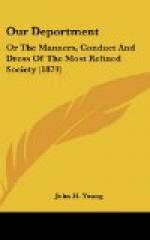UNCIVIL ANSWERS.
Uncivil and curt, not to say rude, answers are sometimes returned to invitations, more frequently the result of carelessness in their writers than of premeditated rudeness.
“Mr.
and Mrs. Adam Brown regret that they cannot
accept
Mrs. Smith’s invitation for Wednesday
evening,”
is a rude form of regret.
“Mr.
and Mrs. Adam Brown decline Mrs. Moses
Smith’s
invitation for Friday evening,”
is a still ruder form.
A curt and thoughtless reply is:
“Mr.
and Mrs. Adam Brown’s compliments and regrets
for
Friday evening.”
REASONS FOR REGRETS.
“All regrets from persons who are not able to accept invitations, should contain a reason for regretting,” is a rule strictly observed in our best society, and is considered especially binding in answering a first invitation. If persons are in mourning, they regret that a recent bereavement prevents them from accepting. Those contemplating being absent from home, regret that contemplated absence from home prevents them from accepting. “A previous engagement” is made the excuse when there is an engagement either at home or away from it, and also when one has no inclination to accept; which makes it quite necessary for those who really regret their inability to accept, to mention what that engagement is.
THE FAMILY LETTER.
It seems hardly necessary to give the form of a letter from one member of a family to another. It is often the case that letters sent from home to an absent member are decidedly unsatisfactory, if not to a great extent of little interest outside of one or two facts mentioned. Consequently some hint as to what those letters should be, are here given. They should be written as though the writer were talking, using familiar expressions, and such peculiarities as the writer possesses in ordinary speech should find a place in the letter. The writer may speak of many trivial things at and about home, and gossipy matters in the neighborhood, and should keep the absent one posted upon all minor facts and occurrences, as well as the more important ones. The writer may make inquiries as to how the absent one is enjoying himself, whether he finds any place better than home, and ask such other questions as he may desire, concluding with sincere expressions of affection from various members of the family. The absent one may, in like manner, express himself freely on all subjects, describe his journey minutely, and speak of whatever he may feel deep interest in. In short, a family letter may be as gossipy as the writer can make it, without much regard to an attempt at showy or dignified composition.




